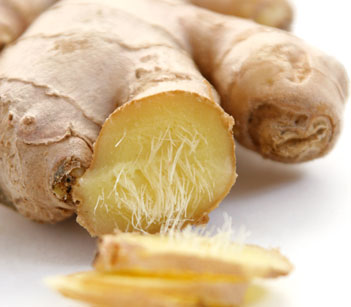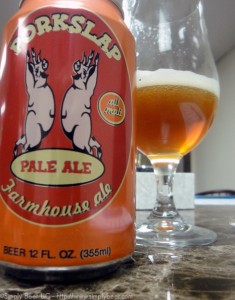Do You Care About What’s in Your Beer?
Ok, this has been bothering me for a couple of days now, ever since we record our last Podcast; Should breweries be listing major ingredients on the beer label? If a brewery brews a style of beer but neglects to put on the label that they added a unique ingredient, for example Ginger, Chillies, Oysters, etc, can that ruin a beer for you?
A week or so ago while we were recording the podcast, we tried a beer from Butternuts called Porkslap Pale Ale. There are two things we try to do in our podcast keep an open mind and try not to read anything on the beer prior to recording. I had limited notes on this beer because the Butternuts website is in flash and my mac is having issues with flash lately. So the only thing I knew was the abv on the beer and a commercial description from Rate Beer which i didn’t read before hand (on purpose). We want to have an open mind and be as positive as we can about the beer, sometimes that is very difficult, like with this beer. Apparently this Pale Ale is brewed with ginger. I really hate ginger in beer. Sorry for those of you who like ginger in beer, I hate it, I find it disgusting. Had I know Porkslap had ginger in it I would have switched it out at the last minute with another beer we had from Butternuts, Moo Thunder Stout. But there was nothing on the label that said this beer was made with a ton (in my opinion) of ginger. I try to be honest and fair, I don’t like to slam a brewery or beer. It is hard work and requires a great deal of skill to commercially make beer. If I may be narcissistic for a sec, I would think a brewery would rather have someone skip over a beer instead of hating it or at least try it know what they should expect.
 This brings me to another point. What about allergies? Does the boiling process “remove” the allergenic properties from that ingredient? I don’t know, but if I were allergic to that ingredient, I certainly would not want to find out. I know there are lots of people with shellfish allergies. When Flying Fish came out with Exit 1, their oyster stout, you could see on the label: “Oyster Stout” and “Beer Brewed with Oysters”. Now if you had an allergy or didn’t like oysters you could avoid the beer.
This brings me to another point. What about allergies? Does the boiling process “remove” the allergenic properties from that ingredient? I don’t know, but if I were allergic to that ingredient, I certainly would not want to find out. I know there are lots of people with shellfish allergies. When Flying Fish came out with Exit 1, their oyster stout, you could see on the label: “Oyster Stout” and “Beer Brewed with Oysters”. Now if you had an allergy or didn’t like oysters you could avoid the beer.
I like to drink good beer which is why I drink Craft Beer, but with craft beer and it’s expanding arsonal of flavors there are bound to be flavors you may not like. Why would I want to have a ginger beer, when I don’t like ginger in beer when there is all the other great beer out there?
One last point, this is not meant to be a bash on Butternut’s Pork Slap beer or the brewery, we did try their Moo Thunder Stout, which was very good. I would like to see ingredients listed on a beer that are not typical or common for the style.
Any Brewers/Breweries who read this far, I would love to hear what you think?
Anyway that’s my $.02.


I agree completely. Like you, I like to know what to expect from a brew; it helps me judge how it stands up against similar beers. Very often I’ll find bottles with the descriptor “ale brewed with spices,” which tells me next to nothing about the actual beer inside. If you’re not going to list the ingredients, at least tell me what style the beer is supposed to be!
@Zach, I would have been happier with Pale Ale Brewed with spice in this case. Guess when you get nothing something is always better. But Ale with Spices is pretty damn generic.
I would certainly prefer that they list their ingredients, however I don’t expect them to unless it relates to allergies. It’d be great to have a standardized label similar to nutritional labels that would list abv, ibu, srm, and ingredients. It would also make cloning easier for us homebrewers ; )
I’m not looking for all ingredients, just what wouldn’t normally be there. Would you include chocolate in a stout maybe, it’s not uncommon. Let us know if there are uncommon things in there, like ginger, chilis, uncle johnny’s armpit hairs. The one think Butternuts did list was the calories, 125 for the can of beer, which I thought was cool.
Dunno if nutritional labels would fly, but I think ABV should be required on all beer.
Yea didn’t mean calories and sugar and all that, but a nutritional type label for beer with beery data like IBUS and such. I would love to have all the ingredients like every malt and hop type, but I know that’s unrealistic. Unusual ingredients would suffice though.
Peter,
I think I might get on board if it was a vague description of malts, spices, etc. Perhaps stating that the beer is brewed with known allergens is another way to approach it (i.e. this peanut butter porter contains peanuts). However, I’m not so sure that proprietary information should be labeled based on the possibilities of what someone may or may not like; not that I’m being contentious with you in particular. Personally, I think Ginger can work well in a beer. It might even be that they are using far too much and that is the real problem.
I think one of the clearest examples of using “out there” ingredients in a subtle fashion is a wit beer. Yet, those same ingredients are notoriously difficult to pinpoint. So much so, that Michael Jackson himself had difficulty pinning them down. Furthermore, brewers of wits and Trappists tend to particularly tightlipped about what is in their beer. Making them list ingredients reduces the nostalgia and the secret of their brewing.
As far as this labeling and ABV discussion goes, I think we are forgetting one thing here. Who is going to make sure this will happen? Sounds like an FDA job to me. I think the Federal Government has their hands in enough cookie jars already…don’t you? The last thing the craft beer industry needs is more red tape and oversight. At least that is my take on this issue.
If you don’t mind, and in the interest of friendly dialogue, I’d like to write a counterpoint article and link to your site. Is that okay with you?
@Michael, By all means I’d love to read your counter point. That is what makes opinion pieces great is the discussion! When it boils down to it, if there is something about that beer that strays far from the norm and I don’t know it when I drink it. My review/opinion is going to be that much more critical. If I know this beer has something unique in it, I’ll have a bit of a more open mind. I for sure don’t want legislation that requires brewers to list everything, that’s not fair. In fact I don’t want any legislation of this at all, just consideration of what people should expect in a beer.
Some of the lack information on labels is ATF requirements, they don’t want certain things on labels, like nutritional information because they don’t want to imply health benefits. As for IBU or other beer technical information most craft breweries don’t have access to a lab and are best guesses.
Here is a great example of this…
http://www.deschutesbrewery.com/blog/2009/02/13/lies-damn-lies-and-statistics/
I am in the middle of a beer project involving getting data on beers from breweries and a lot of them simply don’t know, often when I ask for data I am told check the website.
Not that it isn’t a good idea and yes I would like to see odd or unique ingredients listed but these are some of the issues they face.
@Thomas, very true. I hope my opinion didn’t lead you to think that I’m calling for legislation, I’m not. I hate regulation, but like I Replied to Michael, I would like to know from the brewer what to expect. Why couldn’t butternuts have added “with spice” or something. You don’t need to tell me the spice. Granted I don’t like ginger and still would not have liked the beer, but I may not have been so harsh on the flavor had I know. I don’t like to bash breweries, but I’m human and do I try to react honestly and with forthrightness.
Its a tough one as some brewers want to keep their additional ingredients trade secrets but on the other hand it would be great to have less generic ingredients list, as Zach mentioned. Maybe there is a middle ground where they name just the real exotic ones that are a bit out there.
Cider producers have to adhere to the same caloric and nutritional info boxes as the food industry, I don’t think it would be that much of a stretch for breweries to get on aboard. Maybe more of a pain in the arse than anything, but certainly doable. I like to know what I’m eating and drinking.
Be nice to see all the filler and refined adjuncts and whatever else listed on the macro brews too!
@Michael and others… TTB (The Alcohol & Tobacco Tax & Trade Bureau) already regulates what must appear on labels. TECHNICALLY, Porkslap is required to indicate that it has ginger in it and have their formula approved by the TTB. Unfortunately, you can also get away with things like “malt beverage brewed with spices” so it can be of limited use. However, it falls into the don’t ask-don’t tell more often than we’d all like to admit.
E.G. – We had a comment in the description on our stout, the blurb on the label, about having chocolate in it. So, TTB informs us our label must contain the phrase “stout brewed with chocolate & raisins” and that they will only approve that after they’ve approved our formula. The formula regs also state that only 1.5% of the ABV can come from an adjunct. Now, in theory, this prevents cheap macros from putting too much corn sugar and whatnot in their beers, but it also delays getting beers to market and a myriad of other concerns and so a lot of little guys kind of ignore the regs….
I’d have no problem putting my ingredients on a label, but no way I could afford to have the FDA test my beers for carbs, protein, calories, etc.
@beercartel – It is tough as well as a fine line, I’m fine with secrets, like using lager yeast in a stout or something like that, but definitely agree about letting the consumer know what they are buying or should expect
@Lee – While that would be nice, I’ve only seen that on Green’s Gluten Free beer, maybe because it is registered as gluten free. It seems to me as though may small breweries couldn’t afford this if it was regulated. Not to mention all the specialty release beer we seeing going out may no longer come out bottled.
@Matt – Thanks for the comment Matt, great to see a comment from some one who has had to deal with the TTB and these decisions Some great info on what you have to do to get a bottle/can to market. Besides just the raw ingredient to you beer there is so much more that makes your beer great beer. Your not going to be listing the water chemical make up, boiling times, fermentation temps & Durations, or even the yeast strain. So by know means is saying your stout is brewed with chocolate and raisins does it give away how it is made.
Thoughts provoked. Good points all around and its interesting to learn how regulations already in place that are supposedly designed to bring clarity often do just the opposite via loopholes and such. I don’t want to see a beer uber czar, but I agree w/ Peter that particularly funky stuff might warrant a mention on the label just out of courtesy.
From a purely marketing viewpoint, it would only make sense to divulge unique ingredients and/or those bold in character.
If I’m eying two stouts I’ve never heard of nor sampled; and one tells me up-front that it is “brewed with chocolate and raisins” — guess which one is going home with me.
Likewise, tell me yours is a Pale Ale brewed with Ginger (which I’m quite addicted to) and that will give your brew the edge in shaping my decision to pick your product for a first try. The belly-slapping hogs are “cute” I suppose, but don’t sway my mind nearly as much as knowing that you have included an ingredient which may set your pale ale apart from all the others.
I really appreciate the labels on Rogue’s products: http://www.rogue.com/beers/beers.php
@adrian, thanks for your comment. While I’m not the biggest Rogue fan, I do appreciate their willingness to show the ingredients.
Also, check out Michael’s (comment above) well thought out counter point to my opinion. http://thankheavenforbeer.com/2010/07/20/i-care-about-whats-in-my-beer-to-an-extent-a-response-to-simply-beer/